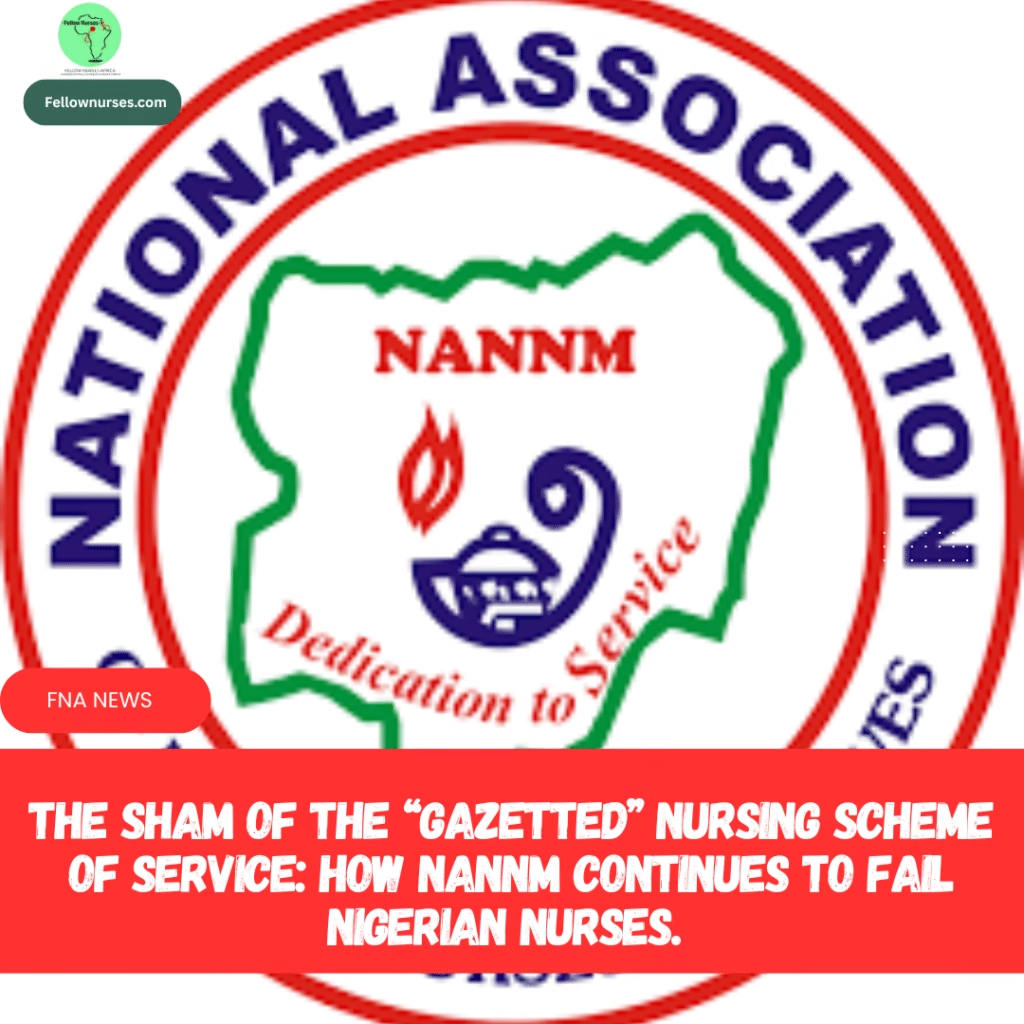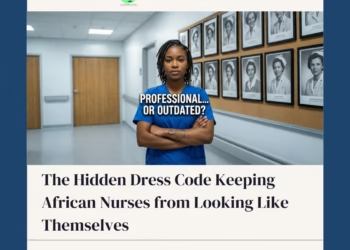Fellow Nurses Africa Publication, 10th September, 2025.

The Sham of the “Gazetted” Nursing Scheme: How NANNM Continues to Fail Nigerian Nurses
When the Office of the Head of the Civil Service of the Federation (OHCSF) announced that the Unified Scheme of Service for Nurses would finally be gazetted, many in the profession rejoiced. Social media buzzed with celebration, and the National Association of Nigeria Nurses and Midwives (NANNM) declared the development a victory for Nigerian nurses.
But strip away the fanfare and what remains is a sobering truth: this “new” scheme of service is nothing more than the outdated 2016 framework dressed up in official publication. Far from being a breakthrough, it is a reminder of how NANNM has once again failed to deliver the real reforms that Nigerian nurses desperately need.
An Outdated Framework
The Unified Scheme of Service approved by the National Council on Establishments (NCE) in 2016 was meant to update earlier schemes from 2003 and 2006. On paper, it outlines career progression from Nursing Officer III at Grade Level 07 to Director of Nursing Services at Grade Level 17.
Duties expand with each level, from bedside care and supervision at the lower grades to policy and administration at the top. Yet, in substance, little has changed in decades. The scheme recycles old job descriptions and leaves Nigerian nursing trapped in the past.
Crucially, it ignores roles that are standard in global health systems today:
- Advanced Nurse Practitioners (ANPs): Specialists with authority to diagnose, prescribe, and manage patients — roles that NANNM itself clamoured to have in nursing
- Specialist Nurses: Trained in oncology, anaesthesia, cardiology, psychiatry, and other critical fields where Nigeria faces massive gaps.
- Nurse Consultants: Senior clinical experts who influence health policy and guide complex care, as seen in the UK and other countries.
By failing to include these roles, the scheme renders Nigerian nursing invisible in areas where it could be transformative.
Higher Education, Lower Value
Another painful shortcoming lies in how the scheme treats nurses with advanced degrees. While MSc and PhD holders are technically eligible for higher entry points or accelerated promotions, their duties remain largely administrative.
A nurse with a doctorate may find themselves shuffling files, drafting memos, or supervising paperwork rather than leading cutting-edge clinical programs or influencing national health policy. This misalignment between qualification and role is not only demoralizing but also wasteful.
Across the world, advanced degree nurses spearhead research, champion evidence-based practice, and lead interdisciplinary teams. In Nigeria, the current scheme reduces their potential to bureaucratic functions.
A Culture of Non-Compliance
Even this flawed framework is not respected. Federal and state health institutions often flout its provisions. Job adverts routinely place nurses at lower grades than the scheme stipulates. Promotions are awarded without regard to qualifications.
In a glaring recent example, someone without a Bachelor of Nursing Science (BNSc) was promoted to the rank of Director of Nursing Services. NANNM did not act. This silence speaks volumes.
The result is predictable: frustration, low morale, and an erosion of professional standards. Many young nurses ask why they should remain in Nigeria when their skills and ambitions are consistently undervalued.
Celebrating the Wrong Victory
The tragedy of this so-called victory is not only its emptiness but its optics. While Nigerian nurses were urged to celebrate the gazetting of an outdated scheme, many of our professional rivals in medicine, pharmacy, and other health sectors could only watch in mockery.
What does it say when the largest group of healthcare workers in Nigeria is found rejoicing over a document that recycles frameworks from nearly a decade ago? Instead of commanding respect, such celebrations expose the nursing profession to ridicule. They reinforce the dangerous narrative that nurses are content with crumbs while others fight for real systemic reforms.
NANNM’s Failure of Leadership
At the heart of this crisis is NANNM’s failure to lead with vision. Instead of demanding strict compliance with the current scheme while lobbying the NCE for a modern, globally aligned framework, the union has chosen to celebrate the gazetting of an obsolete document.
This is not progress — it is a dangerous illusion of progress. It is motion without movement.
NANNM has fought for allowances, internship centralization, and quotas for federal hospital recruitment, but these wins are piecemeal. They do not address the fundamental stagnation in how nursing is structured in Nigeria.
Nurses need leaders who are intellectually rigorous, policy-savvy, and globally connected. Professors of nursing, health policy experts, and advanced practitioners should be shaping advocacy, not union officials content with symbolic victories.
The Human Cost
Behind this policy failure are real people. The young nurse in Ibadan who pursues a master’s degree only to find no pathway for specialist practice. The oncology nurse in Abuja who sees no recognition for her postgraduate training. The PhD nurse in Lagos who spends more time on paperwork than on research that could save lives.
These are not abstract frustrations. They are wasted talents, lost opportunities, and daily reminders of how the system devalues Nigerian nurses. It is no surprise that so many leave for countries that offer respect, recognition, and proper career pathways.
What Must Be Done
To rescue nursing in Nigeria from this cycle of stagnation, three urgent steps are needed:
- Mandate compliance: The federal government must enforce the current scheme of service across all government and private institutions, with penalties for violations.
- Petition for a new scheme: NANNM must urgently draft and submit proposals to the NCE for a revised framework that includes advanced nurse practitioners, specialist nurses, and nurse consultants.
- Redefine advanced degrees: MSc and PhD nurses must be placed in roles that allow them to lead research, innovation, and clinical practice, not just administration.
Conclusion
The gazetting of the scheme of service is not a triumph but a tragedy. It shows how far NANNM has strayed from true advocacy and how Nigerian nurses continue to be shortchanged by outdated policies and weak leadership.
Nigerian nurses form the backbone of our healthcare system. They deserve structures that recognize their expertise, pathways that reward their education, and leadership that fights for their future.
Until NANNM embraces bold, forward-thinking advocacy, nursing in Nigeria will remain stuck in the past — and the nation’s health will continue to pay the price.
Fellow Nurses Africa is the independent voice of African nursing, we educate, inform and support the nursing profession











The writer is educated and prolific but why didn’t you support, suggest or draw their attention until now ? The leadership is weak and refused to probably seek out the eligible members for input. Well, kindly reach out to them patiently for the needful. Thanks